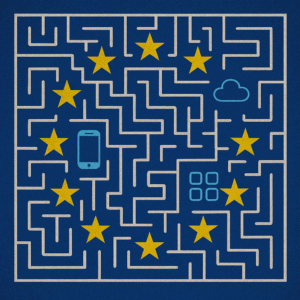Apple Faces EU Fine and New App Store Fee Structure: Implications for Global Platform Regulation
Apple Inc. continues to face a wave of regulatory challenges worldwide, highlighting the growing friction between dominant digital platforms and evolving competition law frameworks. Just months after setbacks in U.S. and U.K. patent cases, Apple is now appealing a €500 million fine from the European Commission, this time over its App Store practices under the EU’s new Digital Markets Act (DMA).
Alongside the appeal, Apple has introduced a new fee structure for its EU App Store, potentially reshaping developer economics and platform governance globally.
This post analyzes the EU fine, Apple’s response, and the broader business and legal implications. It builds on the IP strategy lessons discussed in our earlier blog, Double Trouble – Apple’s Recent Legal Setbacks Highlight Key Lessons in Global IP Strategy. A follow-up post will cover the ongoing battle between Apple and Epic Games over similar in-app purchase restrictions in the U.S.
Apple Challenges EU Fine Over Anti-Steering Rules
In April 2025, the European Commission fined Apple €500 million (approximately $580 million) for breaching the DMA’s “anti-steering” provisions.
The DMA prohibits digital platforms from preventing developers from directing users to alternative purchasing options. Apple had long restricted developers from informing users about external payment methods, a practice the Commission found to violate the anti-steering rules.
Apple is appealing the decision before the EU General Court, arguing that the Commission is overstepping its legal authority. According to Apple, recent App Store changes were implemented to avoid further fines—not because Apple agreed with the Commission’s interpretation.
Key Implications
-
Expanded EU Enforcement Powers: The case underscores the EU’s growing role in policing platform behavior, as the DMA allows proactive enforcement of business conduct.
-
Global Spillover Risk: While the EU accounts for less than 10% of Apple’s App Store revenue, similar laws are being debated in Korea, the U.S., and other regions.
-
Regulatory Momentum: DMA enforcement sets a precedent that may encourage other jurisdictions to impose platform-level obligations
Apple’s New EU Fee Structure: Compliance or Control?
To stay within the law and avoid additional penalties, Apple introduced a multi-tiered App Store fee structure in June 2025 for the EU market. The old 30% flat commission for in-app sales and subscriptions has been replaced by:
-
2% Acquisition Fee: Applies to purchases of digital goods or services within the first six months after app installation.
-
Tiered “Store Services Fee”: Applies to all sales of digital goods or services within 12 months of install (5% or 13%, depending on the service tier selected by the developer).
-
5% “Core Technology Commission”: Applied to digital sales within 12 months of install to reflect Apple’s ongoing investment in tools, technology, and services.
While this structure technically allows developers to use alternative payment methods, the combined fees can reach up to 20%. Critics have called it “compliance theater”—meeting the letter of the law while maintaining margin and control.
Key Implications
-
Cost Shifts, Not Reductions: Many developers still face high fees (up to 20%), with added complexity.
-
Advantage for Large Players: Big apps like Spotify and Netflix may benefit from cost parity, while smaller developers face administrative burdens.
-
Control Retained Through Design: Apple’s layered fees allow the company to maintain gatekeeping power, albeit in a more complex format.
Strategic Lessons from Apple’s Global Legal Strategy
This regulatory episode mirrors Apple’s recent IP challenges in the U.S. and U.K., as outlined in Double Trouble. In each case, Apple adapts to new legal interpretations while seeking to preserve core business strategies.
Key Takeaways
-
Rising Cross-Border Legal Risk: With the DMA, FRAND rulings in the U.K., and evolving U.S. IPR standards, global compliance is now a strategic imperative.
-
Pressure on Ecosystem Economics: It remains to be seen whether Apple’s new App Store fee model is sustainable and if the €500 million EU fine will survive the appeal.
Conclusion
Apple’s appeal of the €500 million EU fine and the rollout of a new App Store fee model mark a new chapter in the debate over platform power and digital market regulation.
As with its recent IP litigation setbacks, Apple must navigate a shifting legal landscape that demands agile compliance and long-term strategic planning.
For companies watching from the sidelines, this is more than a story about one firm’s fines—it’s a preview of how legal frameworks, market expectations, and innovation strategies are converging to reshape the boundaries of the digital economy.
Apple Inc. continues to face a wave of regulatory challenges around the world, highlighting the growing friction between dominant digital platforms and evolving competition law frameworks. Just months after setbacks in U.S. and U.K. patent cases, Apple is now appealing a €500 million fine from the European Commission, this time over its App Store practices under the EU’s new Digital Markets Act (DMA). Alongside the appeal, Apple has rolled out a new fee structure for its EU App Store that could reshape developer economics and platform governance globally.
This post analyzes the EU fine, Apple’s response, and the broader business and legal implications, while building on the IP strategy lessons discussed in our earlier blog, Double Trouble – Apple’s Recent Legal Setbacks Highlight Key Lessons in Global IP Strategy. In a follow-up blog, we will discuss the ongoing battle between Apple and Epic Games relating to similar in-app purchase limitations imposed by Apple in the US.


